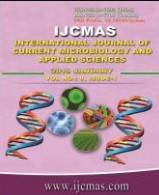


 National Academy of Agricultural Sciences (NAAS)
National Academy of Agricultural Sciences (NAAS)

|
PRINT ISSN : 2319-7692
Online ISSN : 2319-7706 Issues : 12 per year Publisher : Excellent Publishers Email : editorijcmas@gmail.com / submit@ijcmas.com Editor-in-chief: Dr.M.Prakash Index Copernicus ICV 2018: 95.39 NAAS RATING 2020: 5.38 |
Typhoid fever continues to be a major public health problem and the emergence of antimicrobial resistance by Salmonellae typhi adds to the complexity in treating the patients. Salmonella enterica subspecies enterica serovar typhi, the human specific, causative agent of typhoid fever, is one of the most common infectious diseases in developing countries like India 1. Widal test is associated with numerous limitations, but is still considered and extensively used as the diagnostic tool in our area. The bacteriological identification by blood culture is the best confirmative test of Typhoid fever. The aim of the study was to determine the reliability of Immunochromatographic test for the early diagnosis of typhoid fever when compared to the Widal test. The present study was carried out in Tirunelveli Medical College and Hospital, Tirunelveli for a period of one year from June 2017 to July 2018. A total number of 100 clinically suspected Typhoid fever patient's blood samples were taken and blood culture, widal test and Immunochromatographic tests were done. A total of 14 Salmonella typhi were isolated from 100 clinically suspected typhoid cases. A total of 47 samples were tested positive in Widal test. Out of this only one sample was positive for blood culture (True positivity rate – 2.1% and True negativity rate – 75.4%). Out of 26 samples positive for IgM in ICT, 10 samples were positive for blood culture (True positivity rate – 38.5%). Out of 74 samples that were negative for IgM, only 4 samples were found to be positive for blood culture (True negativity rate – 94.6%). In conclusion, the study implies that rapid ICT tests offers increased sensitivity, rapidity and simplicity over blood culture and Widal test, and can be used as a reliable, alternate early diagnostic tool to the most commonly used serological tests.
 |
 |
 |
 |
 |